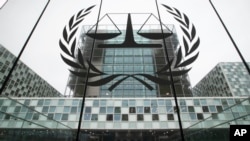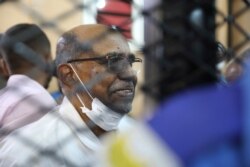The International Criminal Court has begun hearing evidence against Sudanese para-military commander Ali Muhammad Ali Abd-Al-Rahman, also known as Ali Kushayb, the alleged leader of a notorious militia blamed for atrocities in Sudan’s Darfur region.
The hearing will determine if there is enough evidence to proceed to trial on one or more of the 31 charges of war crimes and crimes against humanity Kushayb is facing.
During her presentation Monday, Prosecutor Fatou Bensouda called Ali Kushayb a "willing and energetic" perpetrator of crimes committed in 2003 and 2004 as Sudan’s central government tried to crush an insurgency in Darfur.
Kushayb was arrested after he surrendered himself to authorities in the Central African Republic last year and was transferred to the ICC in the Hague. The court had issued a warrant for Kushayb’s arrest in April 2007.
The hearing is expected to last four days, said Fadi El Abdallha, spokesperson and head of public affairs at the ICC.
“The purpose of this hearing is to decide whether or not a trial will be held at a later stage. It’s a preliminary hearing in which the judges will check the evidence of the prosecutor, will listen to the defense answers and will listen to the victims who are represented through their lawyers,” El Abdallha told VOA’s South Sudan in Focus.
The judges will have 60 days to decide whether or not to confirm one or more of the charges, “and that means whether or not they believe for each of the charges the prosecutor has presented enough evidence to believe or to have substantial reasons to believe that Mr. Abdelrahman committed these crimes,” said El Abdallha.
The judges may also decide to ask the prosecutor for additional evidence or suggest different legal characterizations of certain elements of the case.
Following his arrest last year, the ICC released a statement saying Kushayb was one of the most senior leaders in the tribal hierarchy in the Wadi Salih locality and a member of the para-military group the Popular Defense Forces and reportedly commanded thousands of Janjaweed militiamen from August 2003 until March 2004.
It was Kushayb who allegedly implemented the counter-insurgency strategy of the Sudan government which resulted in the deaths of hundreds of thousands of people in Darfur.
The militia leader is accused of personally participating in some of the attacks against civilians between August 2003 and March 2004, including the killing of civilians, rape, and torture, according to El Abdallah.
Initially, Kushayb faced 50 counts of crimes but Bensouda recently reduced the number to 31, El Abdallah told VOA. The remaining charges include counts of rape, torture, pillaging and attacking civilians, he said.
Kushayb has not entered a plea to the charges but at a hearing last year he told judges the allegations were "untrue."
Former Sudanese president Omar al Bashir and his former defense minister, state minister for interior and a rebel commander are also accused of war crimes committed in Darfur. The ICC issued arrest warrants against all of them years ago.
Bensouda visited Sudan in October urging Sudanese authorities to cooperate with the ICC on all five individuals.
“Sudan has an obligation to cooperate with the ICC because of the resolution of the [U.N.] Security Council which created this obligation for Sudan, and cooperating with the ICC means respecting the ICC founding treaty, the Rome Statute, which allows for different possibilities such either surrendering the suspects against whom there’s arrest warrants, or raising for example changes to the admissibility of the case based on the complementarity principle,” said El Abdallah.
The principle of complementarity allows Sudan to submit a request to the ICC to try the accused at home. El Abdallah said if Sudan chooses to try Bashir and the other accused, ICC judges must decide whether Sudan fulfils all the legal criteria for a competent tribunal. If Sudan fails to meet the criteria, it must surrender the accused to the ICC.
Sudanese officials have reiterated their commitment to cooperating with the ICC but have yet to agree with the court on a process for trying the accused in Sudan.

